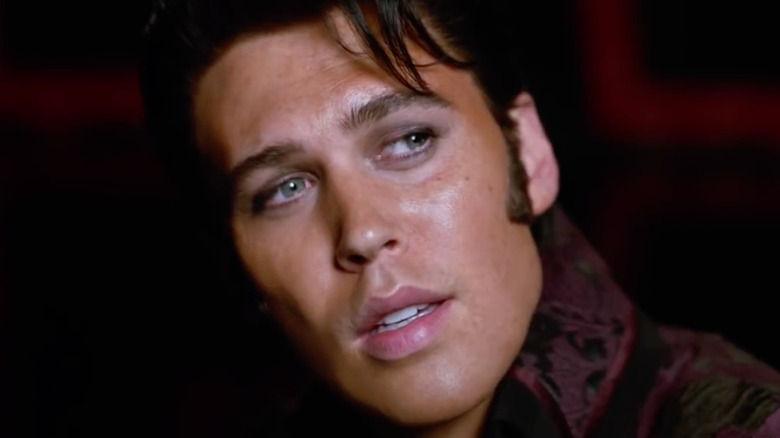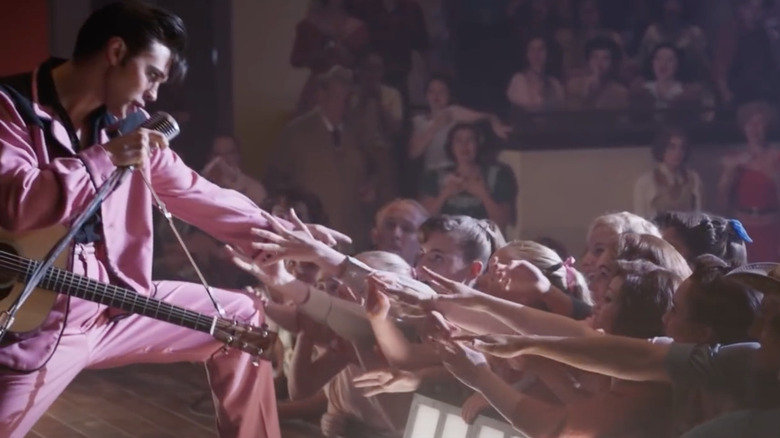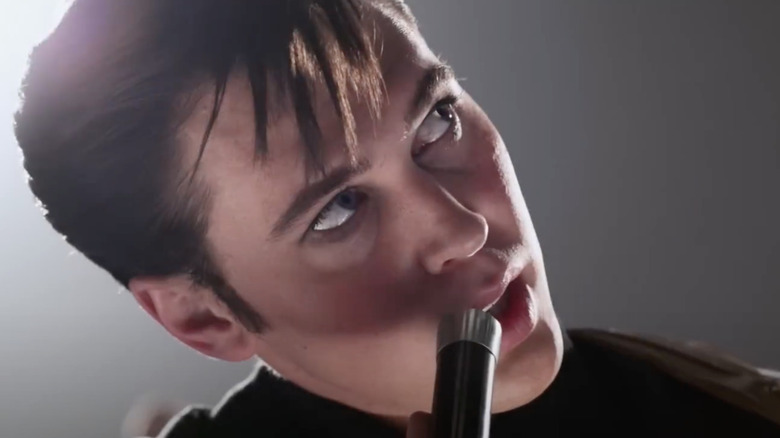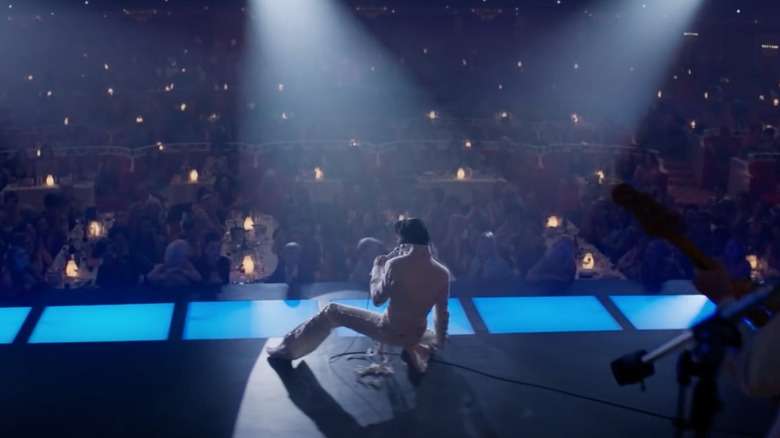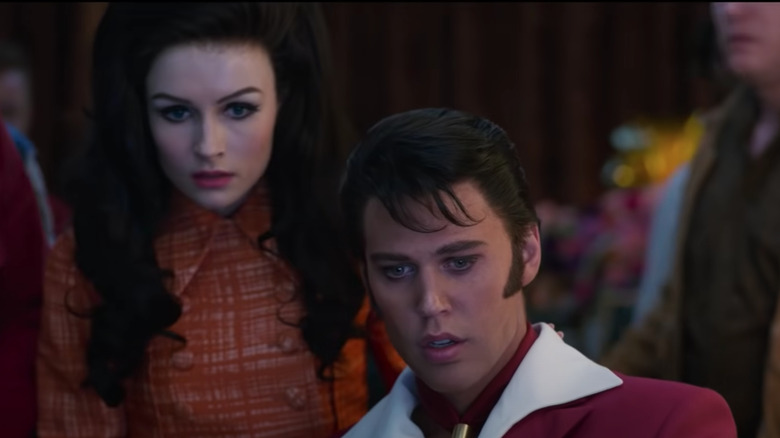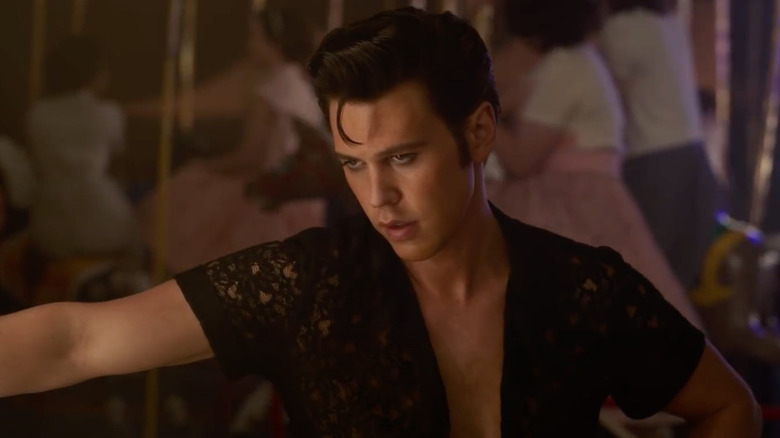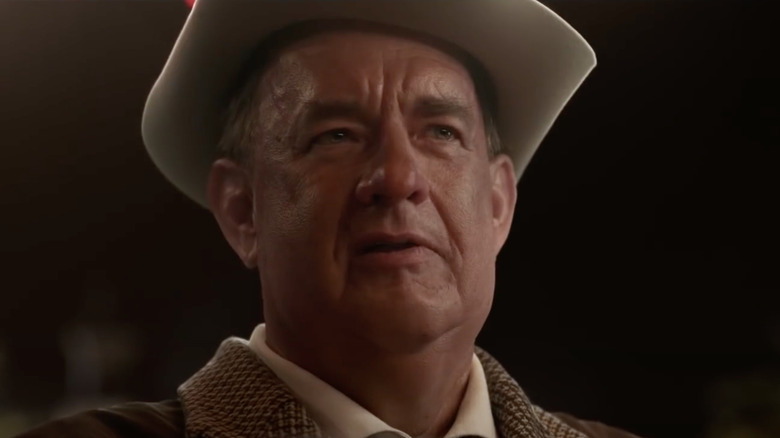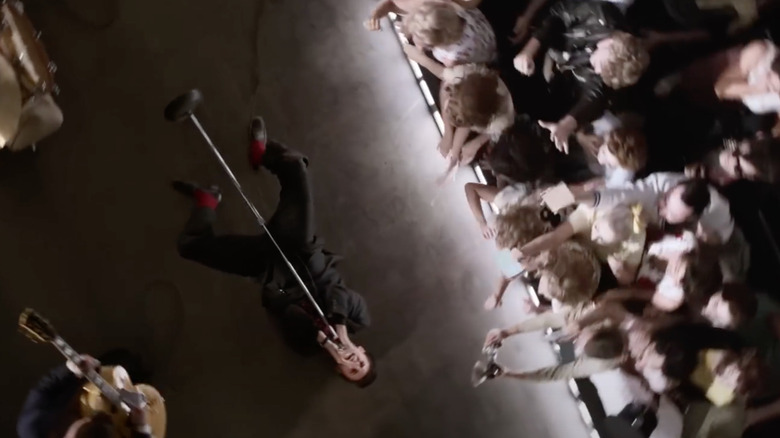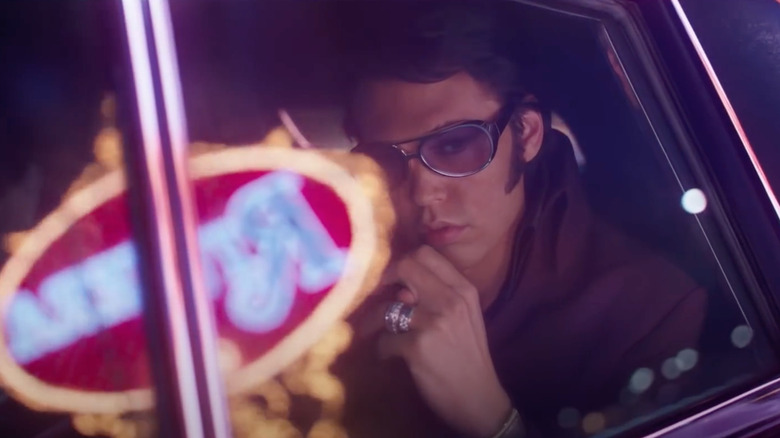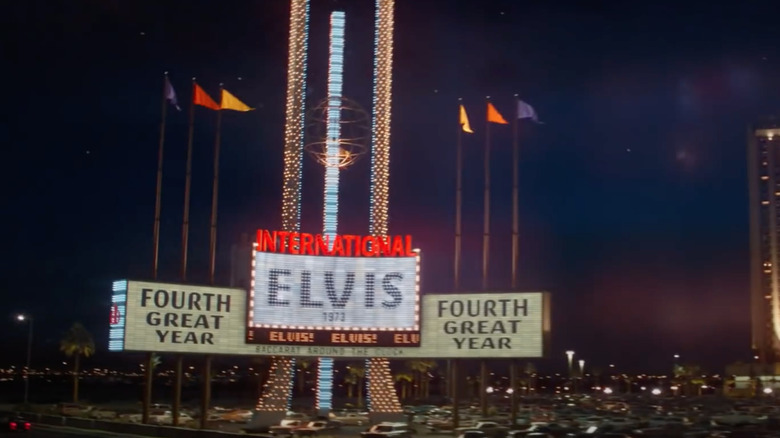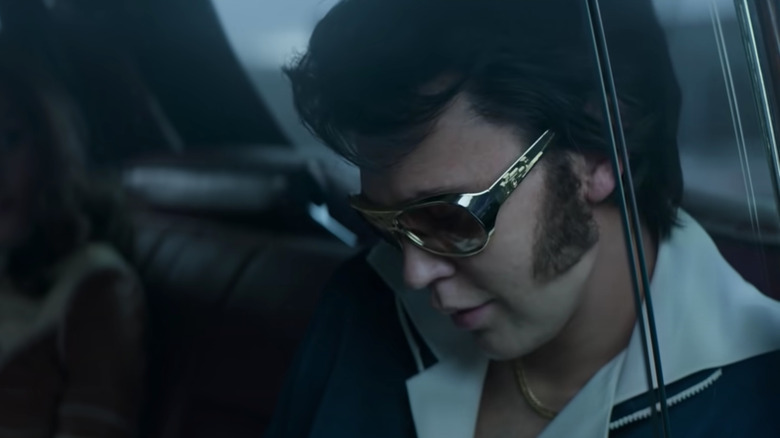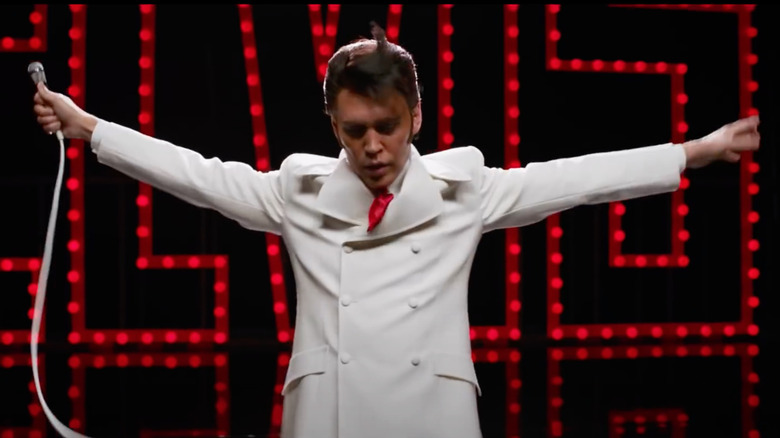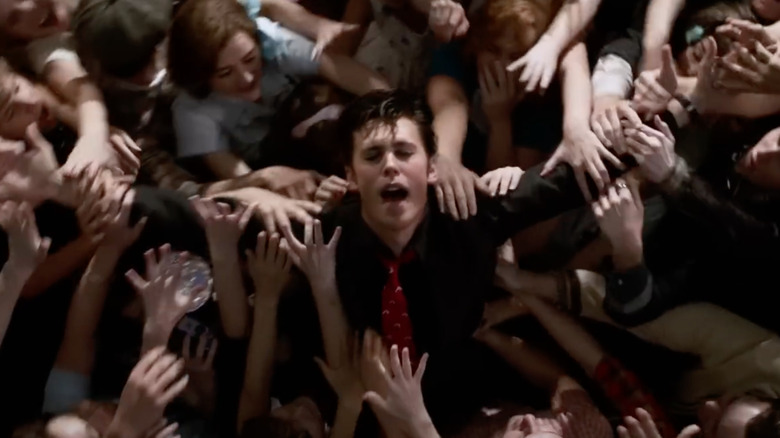6 Best And 6 Worst Things About Elvis
Every decade or so, a rock movie comes along that many hope will bring the genre back. This time, it's Baz Luhrmann who returned after a near-decade movie-making hiatus with his epic retelling of the life of "Elvis." While the film has gotten mixed reviews from the critics, it's definitely a hit with audiences. On opening weekend, "Elvis" outgrossed the box office juggernaut "Top Gun: Maverick," and it has already made over $100 million worldwide, which proves that the movie has "legs," as they say in the business.
"Elvis" is a remarkable achievement that visually and musically goes well beyond the standard rock biopic, and it has many strengths. However, that isn't to say the movie doesn't have its flaws. Whenever you tackle a story as big as Presley's, there's always going to be debates and controversies, and this film has already sparked plenty of both. The following is a list of the six best and worst things about "Elvis," and why the film is ultimately a winner despite its imperfections.
Best: It's a true rock 'n roll movie
If you're a fan of rock movies, "Elvis" really captures what a rock film should be. It's big, over the top, bombastic, colorful, and moves along at a breakneck pace. These are, of course, all trademarks of Baz Luhrmann's work, and his frenetic style is a great fit for the incredible rocket ride of Presley's life. "
Elvis" captures what's sadly missing from rock today: the raw, primal energy and sexual angst that made the music explode. Luhrmann's enthusiasm and passion are off the charts, and you can't help but feel it pouring off the screen. With "Elvis," Luhrmann shows us why Elvis hit like a bomb when he first came along. The '50s were a repressed time, and when he hits the stage for the first time performing "Baby Let's Play House," the audience can't help but go wild. The film captures how rock 'n roll made people feel, how it pushed the right buttons, and how the primal energy onstage, and in the audience, fed off each other, creating a perfect storm of excitement.
Not only can "Elvis" stand proud with the great rock movies of cinema history, but it truly captures the spirit of the music, more so than any other rock film in recent memory.
Worst: It's too long
"Elvis," like a lot of movies these days, is simply too long. The run time for the film is 159 minutes, and while it certainly is not boring for a minute, there are definitely moments where audiences can feel the movie running out of steam as the pacing starts to lag a bit.
Elvis Presley's life and career make for a big story, that goes without saying, and there's a lot of ground to cover. Trying to capture his life in anything less than two hours would give the man short shrift. But again, with the film pushing three hours, it runs the risk of feeling overstuffed.
While it is hard to imagine what could reasonably be cut from the film, if Luhrmann tightened things up here and there, it definitely would have helped a great deal in keeping the initial momentum on pace throughout the picture.
Best: It looks great, and the musical numbers are outstanding
"Elvis" is a very well-made film, and it's a knockout on the big screen. All the technical aspects of the film, including the cinematography, production design, and costumes, are top-notch.
Baz Luhrmann used his regular cinematographer, Mandy Walker, to shoot the film, and she did a terrific job. The attention to detail in the film is remarkable as well. In recreating Elvis' Vegas performances, Walker told Variety, "We reproduced it all right down to the follow spots and the backdrop colors. When you add in all these other elements — the art department, costumes and hair, and make-up- they all come together in harmony to become the visual language of the film."
"Elvis" has a number of lengthy musical numbers — for much of the film, Luhrmann lets the music do the talking — and the recreations of the 1968 comeback special and Presley's Vegas shows are amazing. The musical numbers in the film have so much energy, you get tired watching them, and like Presley himself, Butler gives it everything he's got while he's on stage. (It's hard to imagine how anybody, even a kid in his late 20s, can have this kind of stamina.)
"Elvis" is so well made, and so big in scope, that it's hard to believe that the film only cost a reported $85 million. It looks like it cost way more, and every penny is up there on the screen.
Worst: The role of Priscilla Presley, and her romance with Elvis, is underwritten
One of the odd things about "Elvis" is his marriage to Priscilla feels very underwritten. In fact, Priscilla as a character feels more like an afterthought than an important person in Presley's life. Olivia DeJonge's performance as Priscilla is fine, but the movie doesn't give her much to do, and when the marriage finally falls apart, Elvis is clearly devastated, but the audience doesn't feel his despair, and you don't feel that invested in their relationship because it's nowhere near as passionate as the musical numbers.
Even in a movie that's nearly three hours long, there are going to be areas of Presley's life that will get scant attention or no attention at all. But the romance between Elvis and Priscilla definitely needed more screen time. "Elvis" is a busy movie that has a lot of moving parts, but if the love story were better developed, it could have added even greater dramatic weight to the film.
Best: Austin Butler's transformative performance
Playing Elvis is a role any young actor would kill for. It's also one of the most frightening and challenging roles an actor can take on. You not only have to get the look, the dance moves, and the voice right, but you also have to get the essence of the man. (Not to mention it's a hard role to play without coming across as a caricature.) Butler was previously best known for performing on Nickelodeon and the Disney Channel shows like "Hannah Montana" and "Wizards of Waverly Place," and he knew very well he was taking a big risk playing one of the most beloved figures in rock history.
Butler beat out Ansel Elgort, Miles Teller, Aaron Taylor-Johnson, and Harry Styles for the role, and it's clear he took his job very seriously. As Butler told NME, the first time he wore Elvis's iconic black leather outfit, he was truly terrified. "I'd done so much work, but at that moment I thought, If this doesn't go well the whole film could fall apart and my career's over," he recalled. "It's make or break."
Thankfully, Butler absolutely pulled it off, and to see him nail Presley is a remarkable "star is born" moment.
Worst: Tom Hanks's accent is a mess
One of the biggest controversies surrounding "Elvis" is Tom Hanks' performance as Presley's infamous manager, Colonel Tom Parker. Parker was of European descent, and Hanks performs the role with an odd accent that many have found off-putting.
Even Parker's biographer, Alanna Nash, has said that Hanks got Parker's accent wrong. She told Variety that Parker's real accent was "more American, more rural," adding, "he had what sounded like a slight lisp or speech impediment [though] he didn't have an impediment — he was just trying to wrap a Dutch tongue around the English language, Southern-style." Meanwhile, she also quoted Luhrmann to state, "I thought it was very important that Tom present the audience with a strangeness, a sort of 'What is going on with this guy?'"
Ultimately, Hanks' accent is an acquired taste, and you'll either go with it or you won't. Yet Hanks' performance and accent are nowhere near as bad as his detractors are saying, and in some ways, his voice even adds to the creepiness of the character. (In several scenes, Hanks comes across like a horror film villain — a redneck Freddy Kreuger descending onto his victim.)
Best: You don't need to be an Elvis fan, or a Baz Luhrmann fan, to enjoy the film
Not a huge Elvis fan? Don't know anything about the guy? Not a problem. You absolutely don't have to be an Elvis fanatic to enjoy the movie — although the film could go a long way to converting newcomers into Presley devotees.
Funnily enough, you don't have to be a Baz Luhrmann fan to like the movie, either. The Australian director has a fast-paced, frenetic style that's not for everyone, but with "Elvis," he pulls you right into a very entertaining and engrossing movie, whether you like his previous films (like "Moulin Rouge" or "Romero + Juliet") or not.
"Elvis" is a great starting point for new fans. It's essentially Elvis 101, showing the broad strokes of the King's life and career, and it sets up a good foundation for newcomers to get hooked on his music as well.
Worst: The storyline feels cliché
The rock 'n roll biopic usually follows a familiar pattern we've all seen many times over: An artist has a rise, a fall, a resurrection, and often a tragic end. While "Elvis" has many great musical numbers and packs a strong visual punch, its storyline is very simplistic and it often feels too on the nose and obvious. To be fair, the story of Elvis' life has been retold countless times, and while Luhrmann found an exciting visual way to tell the story, it often falls into cliches we've seen in too many music biopics to list.
It's great to watch Elvis dance in front of a screaming audience for the first time, but it feels a little hokey that Presley can't figure out what's driving the girls crazy until the band tells him, "Them girls wanna see you wiggle! Move man!" The film also shows Elvis literally lost in a house of mirrors as he's trying to figure out his identity. Then, when he decides to make Colonel Parker his manager — a scene that's clearly a deal with the devil — they make their pact at a carnival, which is an obvious symbol of the circus his life is about to become. Elvis' death also cannot get more obvious when the King boards his private plane, the Lisa Marie, and it vanishes off into the clouds, symbolizing his ascent into heaven.
In other words, "Elvis" is certainly not subtle. If you're looking for a movie with nuanced depth, thought-provoking subtext, and an innovative, groundbreaking storyline, well, this isn't it.
Best: The film is a wonderful time machine
When a retro movie is done right, it can truly make you feel like you've been taken back in time. In this regard, "Elvis" is a wonderful time machine that very faithfully recreates the '50s, '60s, and '70s in great detail. Even if you weren't alive when Elvis walked the Earth, the film has an authenticity to it where you're convinced that's how the world really was in those days. And it's a wonderful trip to go back to a world where there was no internet, fans couldn't film concerts with their smartphones, and there was no internet or social media.
When Elvis became a major superstar, it really meant something because he didn't build his career on a reality TV show like "American Idol." Back then, entertainment wasn't as accessible as it is today, and going to see the man in concert really felt like a major event. "Elvis" revisits a time when entertainers felt more legendary and were more mysterious to the public before they eventually crashed down to Earth. Plus, "Elvis" also wonderfully captures the gaudy, glitzy Vegas of the '70s before it became a desert Disneyland.
Worst: The film turns a blind eye to his faults
When watching "Elvis," it's clear that Luhrmann came to praise him, not to bury him. Watching the film, it's clear that it could have done more to show the dark side of Presley, of which there was plenty to dissect, especially in the later years when he became a sad, bloated self-parody.
The fans made Presley a god, but the man was certainly not a saint, and some online critics have pointed out how Elvis should be called to task for grooming Priscilla when she was 14 and for cultural appropriation. (Some argue that Elvis was inspired by Black artists, while others feel he ripped them off.) And of course, you have to wonder if Elvis would be canceled today, like so many other celebrities who engage in sexual misconduct. (Considering Presley's reputation for sexual conquests, it's odd that you only see him in bed with two groupies in the entire film.)
"Elvis" is a story told in broad strokes, it doesn't have shades of grey, but it could have made a much more interesting and complex film if Luhrmann showed more of the dark side of Presley — not to make the film more titillating, but to show that he really was only human after all.
Best: The film's political commentary against gun violence is right on time
A standout moment in "Elvis" is the song "If I Can Dream," a poignant call for peace as the '60s were ending in turmoil. Elvis performed this song on his '68 comeback special, and its social commentary is also right on time with current events. In 1968, the world was devastated by the assassinations of Robert Kennedy and Martin Luther King. In the film, Elvis is profoundly affected as well and wants to say something, but he's discouraged by Colonel Parker from making a political statement. Against his manager's wishes, he performs "If I Can Dream," and it becomes his statement to the world, with a message similar to John Lennon's "Imagine." Elvis truly sings his heart out on "Dream," and it's one of the most impassioned performances of his career.
The scene is intercut with news footage of President Lyndon B. Johnson denouncing gun violence, and with the recent mass shootings that have rocked the country in modern times, the scene hits home hard today. It was a song the world needed then, and it's a song the world needs today.
Best and Worst: Elvis isn't perfect, but overall it's a winner
Yes, at times "Elvis" can feel bloated, over the top, and cliché, but you can say the same about the man himself. Despite the film's imperfections and flaws, enough sticks to the wall that "Elvis" ultimately comes out a winner. It's a story that's been told many times over, but it's how Luhrmann told the story that sets it apart from the standard rock biopic. Whatever the film lacks, it more than makes up for it with his passion and enthusiasm, not just for Elvis, but for rock 'n roll as well. Butler and Luhrmann made the right combination to bring Elvis' story to the big screen, and you get the impression they both gave this movie everything they had. Just as Elvis loved performing to the point of exhaustion, Butler and Luhrmann pushed themselves to the limit as well.
Of course, the king himself can't be here to enjoy his latest comeback, but he'd probably be thrilled he's still remembered, and that his biopic is creating a new generation of fans. (it's also no surprise that with the success of the movie, Presley's music is once again climbing the charts.) Will there be more movies about Elvis in the future? Probably. Will they have a hard time topping this one? Absolutely right they will.
